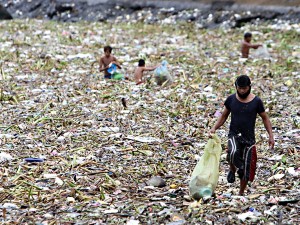It will be processed in the Philippines.
This was Canadian Ambassador Neil Reeder’s solution to dispose of the 50 40-ft container vans of mostly household trash that were illegally shipped from Canada to the Philippines in 2013.
“We found a local solution. Both governments are going to work toward having the garbage treated locally and in a sustainable manner and that case will be closed,” Reeder said in an interview at Tenement Elementary School in Taguig City.
He was there to witness the Department of Education’s Brigada Eskwela program, which engages community members and other organizations in the repair and maintenance of public schools.
Representatives of Telus International Philippines, an outsourcing services provider, and Hands On Manila, a volunteer organization, also attended the event.
Reeder did not say exactly where the waste will be processed, only that both governments “recognize that we’ve made progress, we’ve made a solution.”
Asked how long the processing would take, Reeder said: “You’ll have to check with the Department of Environment and Natural Resources but we’re waiting now for the next step which is the processing of the waste.”
He clarified that contrary to reports, there was “nothing toxic” in the waste.
He said the Canadian government had a “complete study” done and found that the waste was composed “primarily” of plastic and household trash.
“[That they were toxic] was a misconception put forward by groups that were opposed to this from the beginning,” he said.
He said the problem was a “private matter that we (Canada) learned about as a government.”
“It wasn’t our choice to bring the waste here,” he said.
He said that when the issue came out, Canada did not have the means “to force the shipper by law to take the waste back to Canada.”
“And the Philippines doesn’t have the legal means to force the shipper to take the waste back to Canada. So we’re going to deal with that locally,” he said.
Environmental and labor groups had asked President Aquino to tell Canada to take back the containers full of trash, which were declared as “scrap plastic materials for recycling.” The President was in Canada last week on a three-day state visit.
RELATED STORIES
PH decides to dispose of garbage from Canada in local landfill
PH gives in to Canada over garbage dispute
